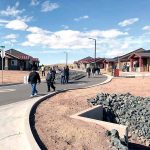
Letters: Strengthen laws to stop outside foreigners
The Navajo Nation needs to strengthen their laws on outside foreigners violating mandates, curfews and laws. The Gadii’ahi, Hogback and Shiprock communities have witnessed for the last eight months outside foreigners violating mandates and curfews set by the Navajo Nation president everyday by tending to the illegal hemp farms that sprang up during one of the worst pandemics.
The residents to this present date continue to see how little our law enforcement can enforce any mandates or laws on outside foreigners. I appreciate the collaboration effort that the Navajo Nation Police has done by establishing the hemp hotline for reporting purposes and the effort in getting the foreigners to comply with the temporary injunction, but I also see how the law has so many technicalities in criminal and civil jurisdiction. The outside foreigners, including our own people, continue to make their way onto the illegal hemp farms during the day and night.
They disregard the temporary injunction to halt all illegal hemp farming activities and the hired security personnel on the illegal hemp farms allow the foreigners access on farms to continue business as usual. They continue to tend to the illegal hemp and marijuana and transporting their goods out of the farm in their own personal vehicles or travel trailers in the middle of the night when few police officers are on duty to respond to community calls.
The hemp security personnel are now using the hemp farms as refuge to host drinking parties and they continue to harass residents in the Shiprock area. I think all illegal hemp farmers and their workers need to be reminded that all activities are to cease operation and there are consequences in not complying with the injunction.
I continue to encourage all residents to continue to report illegal activities on the hemp farms, although we get smart responses from the police asking how we know they are illegal foreigners making their way onto the hemp farms. I have also heard a response that these hemp activity call-ins take the officers away from real criminal activities.
First of all, we have been witnessing these activities for the last eight months and we are all aware of what is going on in our communities. Second, I apologize to the officers that it takes them away from the real criminal activities, but this is their job and, yes, there is real criminal activities happening at the illegal hemp farms.
It is not the community’s fault that we take you away from your job as officers. We need to look at the instigator of the chaos and that is the reason why all this illegal hemp farming takes so much effort to stop. Thank Dineh Benally and his illegal hemp entourage for that. If the Navajo Nation Council did their homework before they approved to pass and re-define the controlled substance definition on hemp and giving a leeway again for farming hemp in the future, we would not be in this mess.
So, as leaders making laws for the Navajo Nation, do your homework, do the assessments on how it would impact the community’s health, social, environmental, culture, emotional well-being, traffic congestion, zoning, etc., now and in the future. The leaders who made changes to the legislation did not think about anything else than how much money they would profit in their pockets.
As of this date, the Navajo Nation has not made any economic revenues from the illegal hemp farming. Council, please note that.
In conclusion, the Navajo Nation needs to seek other avenues in strengthening their laws so that outside foreigners are not able to continue to not comply with the Navajo Nation laws, mandates and curfew violations. And as leaders we need to do a far better job in considering all factors and assessments that it would make on the communities before passing legislation.
Malinda Notah
Gadii’ahi, N.M.
Where are the jobs?
I have been voting blue most of my adult life until the last election. My family voted blue their whole life. Where are jobs? In the 80s and earlier, I have heard of many Navajos funding jobs with factories that used to be on the reservation like General Dynamics for one.
Where have all these jobs gone? I see sawmills that once supported two small towns. Gone for a long time, these two towns are barely surviving. Come election time I always hear “the federal government has to do more.” Why do we have to rely on the feds?
I hear a lot of people say, “We are a strong people”. If we are, why do we rely on the government for so much? Voting blue makes this worse. We never improve our performance on our jobs we lose it, so why are we keeping this part of Arizona blue? What have they done besides make red look bad?
We need to get our people out of this rut and bring prosperity to our reservation. Why do we now need to go in debt tens of thousands of dollars just get a “degree” for a good job, only to be in debt for the next 15 years? We need more jobs where we can make a decent living and contribute to society. For example, the tribe attempting to acquire Remington.
If done right it would have brought many good paying jobs to people who can’t or choose not to go to college. Thank you to the president and vice president for being a great example of how America should be.
They have different views, but they have the same goal “make our reservation great”. These two should be examples of how all Americans should be towards one another. How many times have you heard of our Navajo president and vice president not getting along? I have read about this in our newspaper many times, but not with these two. This same ticket has my vote for sure next election.
Craig Willeto
Sawmill, Ariz.
Support children, schools, teachers
I am sure you have all seen the political advertisements of Prop 208. This has always been a tricky area in terms of public messaging. We live in a country that holds strong beliefs about the need for an educated populace, but with the faltering economy, this belief has been tested beyond prior boundaries.
Arizona public schools, including Navajo public schools, have never been asked to do more with fewer resources under a higher level of public scrutiny — and with higher expectations for all students’ achievement — at any other time in our history. Conservative politicians are often ranting about the high costs of education, and how every year, more and more money is spent on public education.
The fact is the Arizona Republican legislators and the governor has consistently cut into K-12 school, higher education and community college funding. The list of responsibilities that K-12 schools have has increased substantially over the past 20 to 30 years.
This includes feeding students, clothing them, teaching healthy habits, character development, bully prevention, sex education, suicide and drug prevention, and services and resources for students with exceptional needs. Republicans make the claim that if Prop 208 is approved, the funds will not reach the classroom to a reason for using that claim to back the use of private school vouchers and charter school development and funding.
U.S. Secretary of Education, Betsy DeVos, and the Arizona Republican legislators believe that by privatizing education, parents will have a stronger say in the way their children are raised, and educational funding will be used to create academic competition among students that would in turn increase student achievement.
On the contrary, research case studies have proven that the surest way to increase student achievement is to focus on teacher development and by backing real school leadership.
That takes money. The fact that Arizona ranks near the bottom of all states in quality of education, amount spent per pupil and teacher salary, are very good reasons why it is important to vote in favor of Prop 208.
There is total accountability. The funds are specifically allocated. Just read pages 129-135 of the “What’s on my Ballot” that you received in the mail. Do the right thing and support your children, your schools, and your teachers.
Joseph Martin
Flagstaff, Ariz.
A half-baked, half-witted scheme
A commentary on the press release of Oct. 9, “Nez-Lizer administration approves hardship relief funds for enrolled Navajo Nation member, chapter relief funds, and broadband initiatives.”
This is more like an escape from further blunder, yet is a public attention-seeking political administration. Since it is federal dollars, what is now demonstrated is a frantic scramble to avoid-the-blame and dodge-the-bullet by the administration.
It is as though this administration is fast-pacing a half-baked, half-witted scheme in its attempt to write off all the green notes before Uncle Sam takes them back. And its resolve is their last-minute washing-of-hands and passing the buck to the moneychangers?
In its reaction, without insight, nor foresight, it could be on a possible head-on collision course with an aftermath. As understood, the current hindrance has been constant delays of distribution and actual use of the federal aid as deadline nears.
Even the administration’s proposed financial hardship relief to certain citizens have no established guidelines on qualification factors as to who fulfills their definition of “a hardship case.”
Then there is the anticipated trickle-down effect distribution to our local chapters, which for some chapters, goes right into the sticky hands of certain stingy chapter politicians.
Thereafter, conflicts and frustrations of community members. As history accounts, at times such monetary public assistance at the local community level never reaches its intended citizens.
This is because certain chapter officials always cheat their community out of their assets and resources. This is where local malevolent public officials bully and push aside the underprivileged community citizens and the politicians become bottom feeders, inviting a free-for-all for their family and clan members. In the end becomes nothing more than political squander of public trust, including the plunder of assets and resources, all without compliance or consequences.
These obvious of a local chapter governing system gone wrong, driven by abnormality and dysfunction, and mostly greed. It is a basic fact our underprivileged and less fortunate do need financial assistance.
They do not have access, may have difficulty, or have been denied, to the basic necessities of life. These include access to information, finance, transportation, food, water, utilities, clothing, shelter, and to the renderings of proper public service, social justice, and social equality.
However, there is the lockdown, including weekday stay-at-home orders because of the deadly pandemic. The first-come, first-serve basis approach may not fulfill this supposed compassionate financial rescue of our disadvantaged citizens.
Surely, right off what could be seen is, first in line, an endless bumper-to-bumper of latest model, high-priced vehicles with darkened windows, with rude drivers and grandchildren demanding an application for Nez-Lizer administration’s free cash giveaway.
It seems if certain citizens with hardship cases are to receive their compassionate financial hardship relief assistance then there is a need for communication and current information on the unfortunate. Whether personal or at the chapter level, it might involve social representation and close monitoring to ensure their relief funds are delivered and well spent by the intended few.
To identify them, if there are databases and records of home visits by various social services entities (e.g., behavioral, safety, police, mental, and health) then such documents should pinpoint and identify living circumstances and conditions of citizens in real need of financial hardship relief assistance. This could be conducted without the loud and proud declarations of self-praise or blame from the Nez-Lizer administration.
On the lighter side, if such standard information gathering fails, and to simplify the problem, take heed from Uncle Sam on how his agents sometimes collect information about certain citizens in a roundabout, old-fashioned way — in which the amount accumulated determines social status, as they dig and sift through their trash during late night hours.
Robert L. Hosteen
Beclabito, N.M.
Leaders should fight alcohol, meth
Seems like the casinos and alcohol moneymakers don’t want to lose to hemp. Hemp will make more beso than all the casinos made in 10 years hemp will make in one season.
The money would go to the farmers, not the tribe, not state, not the U.S. government, but the farmers. Why can’t you leaders fight alcohol and meth? Instead you choose a plant given by the Creator for medicine. If you’re a Christian, read Genesis 1:13.
If you’re traditional, you should know it’s a plant. Classifying hemp as marijuana is insane.
These are the facts. Alcohol and meth has killed more Navajos than hemp. In the history of the universe, hemp has never killed any Navajo or anyone. What Dineh did was wrong should only hire Navajos first on the rez.
Our leaders are not hustling for the people. Instead wait for government handout to run tribal government. With hemp, our tribe wouldn’t need that U.S. government handout.
“Sha, sha, sha” government leaders then have the audacity to say “sha, sha, sha” to your people. Our leaders are weak to legalize hemp and medical marijuana on the rez, so every farmer and entrepreneur can make beso and be self-sufficient.
Mr. Nez signed that CARES Act to help your people. If you love your people, as you claim, you would’ve signed it in person the same minute it was passed. Why are you so quick to bury your people with contracts with funeral homes? Help your people while they are above ground, not when they are below ground.
Richard Anderson Jr.
Crownpoint, N.M.
Not opposed to hemp, stay away from weed
I am not opposed to hemp growing on the reservation as long as the cultivation stays away from marijuana.
A distinction between hemp and weed/marijuana has to be made. Hemp can be used to make canvas, oil, fuel, milk, and not for getting high, which is why growing hemp in the U.S. was made legal.
Potentially it can help lift people out of poverty and provide work. Potentially it can jumpstart a textile industry on the reservation.
Hemp does not poison the earth. It was once widely cultivated in colonial America for canvas for sails and rope. Hemp’s cousin, hops, is still cultivated for beer in the Midwest.
The deep roots of the hemp plant can regenerate compacted land no longer good for agriculture. Hemp farming is not strip mining or gambling. Potentially it can be used as cattle and sheep feed.
I think one of the obstacles to hemp cultivation is jealousy — people upset that some people are getting rich. We, as a people, at the individual and tribal level, need to work to solve our own problems and not rely on the federal government to solve those problems or even the tribe or chapter to make our lives better or the lives of our families.
Ron Lupson
Salt Lake City, Utah
Need volunteers to test water
My name is Ananya Sridhar. I am a high school student and the founder of The Neptune Project, which is working to ensure that every child has access to safe and clean drinking water.
Many communities in the Navajo Nation have contaminated water; lead-polluted water has a particularly acute effect on children, leading to permanent brain damage. The Neptune Project has raised money to test and remediate outdated, polluted pipes.
We are searching for volunteers who are willing to test water sources; we’ll send the testing kit to you, you’ll test sites in your community, and you’ll ship the test results to labs. Your work will help us deliver clean water to your community.
Contact us at waterbyneptune@gmail.com or call 408-568-7045. You can also visit our project website, waterbyneptune.com.
Ananya Sridhar
San Francisco, Calif.








 Highway 264,
Highway 264, I-40, WB @ Winslow
I-40, WB @ Winslow